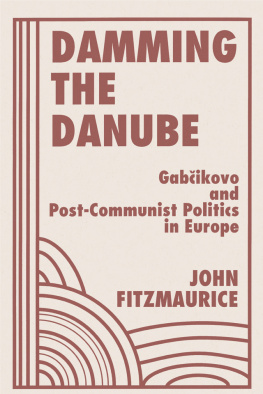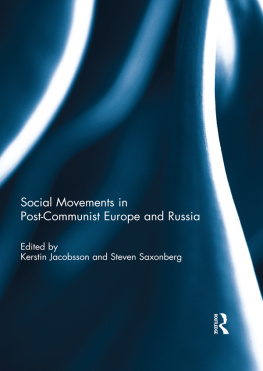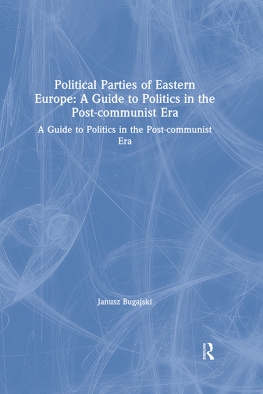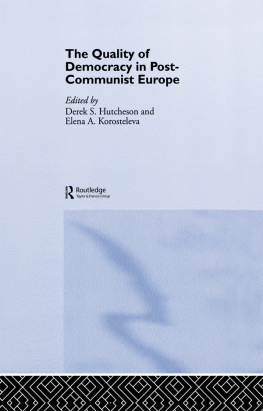Social Democracy in a Post-Communist Europe
Social Democracy in a Post-Communist Europe
edited by
MICHAEL WALLER, BRUNO COPPIETERS
and
KRIS DESCHOUWER
First published 1994 by
FRANK CASS & CO LTD.
Published 2013 by Routledge
2 Park Square, Milton Park, Abingdon, Oxon OX14 4RN
711 Third Avenue, New York, NY, 10017, USA
Routledge is an imprint of the Taylor & Francis Group, an informa business
Copyright 1994 Frank Cass & Co. Ltd..
British Library Cataloguing-in-Publication Data
Social Democracy in a Post-Communist Europe
I. Waller, Michael
320.5
Library of Congress Cataloguing-in-Publication Data
Social democracy in a post-Communist Europe / edited by Michael Waller, Bruno Coppieters and Kris Deschouwer.
p. cm.
Includes bibliographical references and index.
1. Europe, EasternPolitics and government1989Congresses. 2. Socialist partiesEurope, EasternCongresses. 3. Post-communismEurope, EasternCongresses. I, Waller, Michael. II. Coppieters, Bruno, III. Deschouwer, Kris.
JN96.A2S63 1994
324.247072dc20
93-36936
CIP
ISBN 13: 978-0-714-64522-3 (hbk)
ISBN 13: 978-0-714-64092-1 (pbk)
All rights reserved. No part of this publication may be reproduced in any form or by any means, electronic, mechanical, photocopying, recording or otherwise, without the prior permission of the publisher.
Contents
Kris Deschouwer and Bruno Coppieters
Alastair H. Thomas
Andreas Stadler
Johan Jeroen De Deken
Michael Waller
Dieter Segert
Jan Vermeersch
Radzisawa Gortat
Gyrgy G. Mrkus
Heinz Timmermann
Bruno Coppieters and Michael Waller
In 1989 the bicentenary of the French Revolution was celebrated, with the dclaration des droits de lhomme et du citoyen being evoked during the summer as the major milestone of the revolution. Historical and philosophical studies drew extensively on it, assessing its meaning for contemporary democracy. The revolution was commemorated in political debates, too, social democrats and communists exchanging arguments on the significance of revolutionary methods for achieving social progress. No new perspectives emerged from these discussions. The two currents differed in their views of past revolutions, but they were agreed that a revolutionary strategy was no longer appropriate in the Europe of today. A revolutionary overthrow of state power was equated with violent and brutal change. Could it be otherwise in a world in which 1789 and 1917 represented the classic models of revolution?
Events in the autumn of 1989 suggested that a new model might have emerged. The semantic discussion of the concept of revolution was given a new twist with the peaceful fall of communism in east-central Europe. These events made 1989 a quite unique commemoration of the French revolution.
1789 and 1917 had a political significance for the whole of Europe. Each of those revolutions led to the emergence of new ideological cleavages. The opposition between those who were later to be labeled conservatives and liberals, and that between social democrats and communists, were based largely on irreconcilable interpretations of the revolutionary events, but they had longlasting effects on the way in which the postrevolutionary order took shape. Will 1989 have a similar significance for the future of Europe? Will the fall of communism lead to a total transformation of the ideological landscape? Who will be the winners, and who the losers?
These questions may partly be answered by analysing the evolution of the major political currents in Europe. At an international conference held in Brussels in October 1991 the present prospects of one such major current social democracy were examined.1 Disadvantaged for a number of reasons in the emerging party competition in east-central Europe, the social-democratic parties of the region were analysed at the conference with regard to a social democracy in western Europe which is itself suffering from a crisis of identity.
How do social-democratic parties in either part of Europe stand in relation to governmental power? Are the economic and social problems by which both sets of parties are currently being assailed to any extent shared? How far do the social-democratic programmes and organizations in Europe resemble one another? To what extent does the discredit cast on socialism by the failure of communism reduce the perspectives of social democracy in the west of the continent, let alone in the east? In what ways does the strong emergence of nationalist parties and ideologies affect the fortunes of social democracy? What will be the impact on western social democracy of the social-democratization of so many of yesterdays communist parties in the east? Answers to these, and other, questions were sought at that conference, and are recorded now in this volume, which presents the conferences conclusions.
In the first part of the book, a number of over-arching themes are treated. First, social democracy in both east and the west is put in a comparative perspective by Kris Deschouwer and Bruno Coppieters. Then Alastair Thomas presents an overview of Western social democracy which brings out the distinctiveness of its various models. Andreas Stadler addresses a particular aspect of the international influences to which the process of democratization in east-central Europe has been exposed the role of the international funding agencies and he assesses the importance of the resulting dependence for the future of social democracy in the region. Still from a vantage point in the west of Europe Johan De Deken presents the social policy regimes at present on offer and considers the direction that social policy might take in the countries of east-central Europe. This is a question of obvious relevance to the fortunes of social-democratic parties in a post-communist period.
The second part is largely taken up with case studies: Dieter Segert on the ex-GDRs SPD, Jan Vermeersch on social democracy in the Czech Lands and in Slovakia, Radzisawa Gortat on Poland, and Gyrgy Mrkus on Hungary. The scene is set for these case studies by a discussion by Michael Waller of the factors that have shaped the circumstances of east-central Europes social-democratic parties today. Finally, in a chapter that brings the discussion round again to questions of definition raised by Alastair Thomas, Heinz Timmermann takes stock of the problem that the reform orientation of the deposed communist parties causes for the Socialist International.
Until September 1993, it was possible to say that, apart from the exceptional case of the ex-GDR, only in the Czech Republic was a social-democratic party taking up an influential position within the party system. The Polish elections of 1993 made the prospect of the social-democratization of the former Communist parties a reality when the Democratic Left Alliance, at the heart of which was the post-communist Social Democracy of the Polish Republic, headed the poll, and went on to form a government, in coalition with another post-communist party. The international nature of social democracy and its long historical roots are likely to guarantee the social-democratic parties a future. The real question, however, as is suggested by Heinz Timmermann amongst others in this volume, is not whether social democracy will survive, but which of the competitors for its historical mantle will ultimately don that mantle.










